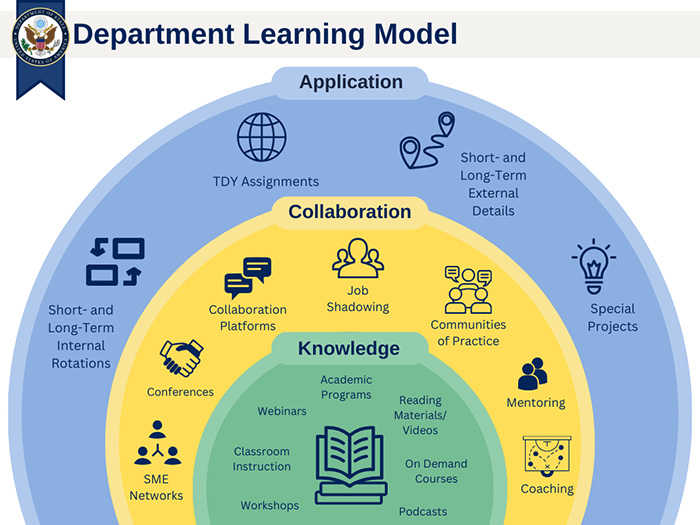A Look at the New Learning Policy: How, When, and Where Do State Department Employees Learn?
The Learning Policy is intended to stimulate a culture shift around learning and training at the State Department.
BY SARAH WARDWELL
Straight from the Source is the FSJ space for the foreign affairs agencies to inform the FS community about new policies or innovations in operations. What are your thoughts about the new Learning Policy? Please send your feedback as letters to journal@afsa.org or comment on FSJ LinkedIn.
There is a clear consensus that the State Department needs to take a more systematic approach to professional training and education for all its employees. As Secretary of State Antony Blinken articulated in October 2021, “We need to put the State Department in the best possible position to confront the challenges facing our country, and we need to build, support, and protect the workforce that makes everything that we do possible.”
Traditionally, the State Department has leaned on mentorship or learning on the job to develop the skills of employees during the middle of their career. While these are important parts of a professional development program, former senior leaders suggest the department needs a more methodical approach (see the report by Ambassadors Nicholas Burns, Marc Grossman, and Marcie Ries, “A U.S. Diplomatic Service for the 21st Century,” Harvard Kennedy School, Belfer Center for Science and International Affairs, November 2020, pages 26–27 and 29–35). Similarly, a needs assessment completed by the Foreign Service Institute (FSI) School of Professional and Area Studies in 2021 identified concerns with respect to the training and performance of the department’s mid-career Foreign Service (FS) and Civil Service (CS) professionals (FS-3/2 and GS-12/13/14).
Recognizing the need to nurture a culture shift around learning, Deputy Secretary for Management and Resources Richard Verma (D-MR) introduced State’s first Learning Policy in September 2023, as part of Secretary Blinken’s Modernization Agenda. The Learning Policy redefines the department’s approach to learning. It prioritizes learning as a part of the department’s culture by dedicating more time for learning, empowering employee–manager learning partnerships, and expanding learning opportunities.
The main elements of the new Learning Policy include:
- The new Core Curriculum for mid-career professionals.
- Up to 40 hours of dedicated learning hours per employee per year.
- Expanded use of Individual Development Plans (IDPs) for all employees.
- Additional professional development and training options, especially in support of critical mission areas and Civil Service professional mobility.
The new policy applies to all State Department U.S. direct-hire employees and eligible family members (EFMs) on family member appointments (FMAs). The department is encouraging overseas posts to adopt similar practices to the extent possible for locally employed (LE) staff and other employed EFMs, in accordance with other agency policies and local labor laws.
Although there may not be a YouTube video to teach diplomacy, in today’s world there are many alternate ways to learn beyond the traditional classroom.
To help employees navigate the new policy, FSI and the Bureau of Global Talent Management put together an internal “Learning@State” website that outlines the policy, along with frequently asked questions, and links to relevant learning materials.
Cynthia Davila, a management-coned Foreign Service officer currently serving in Mexico City, helped to craft the new Learning Policy while serving domestically in the Director General’s Innovation Unit. Reflecting on the importance of the new policy, she said: “The Learning Policy widens the aperture of what learning can look like beyond the traditional classroom—coaching, listening to podcasts, attending seminars, etc. Consciously integrating learning into the continuous professional development of our employees ensures that State’s workforce upskills and is fully prepared to meet tomorrow’s challenges.” The general services section in Mexico City has already begun implementing the Learning Policy, and Davila hopes other sections will follow their lead.
The Core Curriculum

A diagram of the State Department’s new learning model.
U.S. Department of State
Early in 2023, FSI introduced the Core Curriculum to help employees build the skills they need to succeed in their careers. This was the first step in the State Department’s broader efforts to foster a culture of career-long learning and to help ensure employees are afforded greater opportunities to participate in professional development and training. The Core Curriculum is a recommended set of courses for mid-career professionals designed to develop a common foreign affairs skill set. It focuses on a broad spectrum of critical skills, ranging from leadership to strategic planning, negotiation, and working in the interagency.
The Core Curriculum contains a mix of existing and new courses as well as a few that are still in development (see sidebar, below). Feedback from the post-course evaluations to date has been overwhelmingly positive. Zachary Segal, a Civil Service employee in the Bureau of Legislative Affairs, was one of the first students to take a new Core Curriculum class, “Succeeding at State: Core Skills for Mid-Career Professionals.” In a follow-up conversation a few months after completing the course, Segal said the course taught him useful skills such as strategic empathy, ways to leverage your network, and understanding the pressures your colleagues and supervisors experience. He said the course was general enough to apply to everyone in the department and that it brought together a unique group of employees who shared their diverse experiences.
The course spurred real change for Segal. He shared that he had never considered taking on a managerial role, as he had always seen himself as a subject matter expert. Following the course, he realized that he was ready to take the leap and work toward a management position, a positive move forward in his career that he had not anticipated.
As Deputy Secretary Verma said in his message rolling out the policy, “This policy is an essential investment in you, your professional development, and in our organization’s agility and effectiveness in a rapidly changing world.” But as one of the Core Curriculum course designers noted, “A five-day course won’t fill the gap of the continuous learning need.” Individuals still need to supplement their growth with additional learning. And although there may not be a YouTube video to teach diplomacy, in today’s world there are many alternate ways to learn beyond the traditional classroom. This is why the Learning Policy has two other key components: dedicated learning hours and the expansion of IDPs. Industry experts found that planning and dedicating time to learn are the most important components in building a learning organization, one that remains at the forefront of their industry and continues to attract and retain top talent.
Dedicated Learning and the IDP
Core Curriculum Courses
- Congressional Relations
- Data Literacy for Managers
- Fundamentals of Supervision
- International Negotiation: Art & Skills
- Leading at State
- Leading with Influence
- Managing Foreign Assistance Awards
- Presentation Skills
- Succeeding at State: Core Skills for Mid-Career Professionals
- Working in an Embassy
- Better Feedback for Better Writing: A How-to Course for Supervisors and Leaders
- Navigating the Interagency*
- Refresher Supervisory Training*
- Strategic Thinking/Planning*
- Program and Budget Management*
- Public Communications 101*
*Courses are under development/coming soon.
Dedicated learning hours allow employees to take advantage of the myriad ways that people consume information in the modern age—such as taking an online course, watching videos, listening to a podcast, attending a conference, or even reading a particular book. Not all learning happens in a classroom; accordingly, dedicated learning hours are not limited to classroom coursework.
To determine how best to spend learning hours, the new Learning Policy encourages employees to create their own IDP. Working with their supervisor, employees identify and establish learning goals that will help them achieve their mission and professional development goals. Civil Service employees are already familiar with creating an IDP. It is logical to expand this beneficial planning document to Foreign Service personnel, EFMs on FMAs, and limited non-career appointments—including consular fellows and LE staff. The IDP is different than the counseling sessions that are currently part of the Foreign Service performance evaluation and management system. The IDP is designed to take a longer-term look at the employee’s professional aspirations and goals.
For some bureaus, asking employees to set aside special time to focus on learning is not a new concept. The Bureau of Consular Affairs (CA) has been particularly innovative, holding annual Consular Leadership Days since 2001. CA designates an annual theme for these leadership days based on one of the Consular Leadership and Management Tenets. Teams close the consular section to routine appointments for a day and focus on team- and skill-building. Consular sections are expected to hold monthly training and development days so that all staff are working to develop needed skills. CA’s dedication to continuous learning is a model for workforce development.
The Learning Policy provides the framework to create lasting change in our workforce. Employees and supervisors alike play an important role in implementing this policy for meaningful results. It will take collaborative commitment to see an institutional shift to a learning culture.
As Alexis Ludwig, retired FSO and former director of the Core Skills for Mid-Career Professionals pilot, said: “You have to take the initiative with your own career. It is the responsibility of each of us to think deeply about what we need to do in the coming year to improve.” Given the ever-growing amount of information available, the Learning Policy explicitly promotes greater collaboration between employees and supervisors on identifying learning goals and how to achieve them. Both employees and supervisors can consult not only the FSI catalog but also look at what other industry leaders are reading, watching, and listening to. Staying on top of emerging trends, from China to artificial intelligence (AI), will require engaging more with quickly evolving media, such as expert-written blogs, podcasts, and videos.
The Bureau of Consular Affairs’ dedication to continuous learning is a model for workforce development.
The policy encourages 40 hours of dedicated learning, which can be broken down into time increments that make the most sense for the individual’s learning goals and best fit into their schedule. If someone wants to work on job-related language needs, they may decide to take a mentor-guided course for eight hours of learning time, using one hour per week. Learning a language requires more regular practice, so the individual may carve out 15 minutes on other days of the week to focus on language learning. This practice may consist of study with a language app, searching for videos to work on a specific grammatical issue, or practicing with an LE staff member.
For some offices, it may work best if the entire team sets aside one hour per week to focus on individual goals. Setting aside time on individual or office calendars can be a helpful reminder to make sure that working days are not fully consumed by meetings or taskings. For others, working on a dedicated course or type of learning during a season when the workload is more manageable might make more sense.
Flexibility Is the Key
As he stated during a town hall earlier this fall, Deputy Secretary Verma emphasizes that flexibility is a key component of the policy designed with employees in mind. Ultimately, the policy is meant to be a springboard for culture change—truly integrating continual learning into the fabric of our organization. Many have suggested that to really change the culture, the policy’s major components (Core Curriculum, dedicated learning hours, and IDPs) should be mandatory, otherwise the press of other business will always win out. Those concerns are valid, particularly given the pace and volume of work the workforce faces.
The decision to strongly encourage, not mandate, at the present time stemmed from two related considerations. First, the architects of the policy believe that this form of culture change would be best achieved through voluntary compliance. Mandatory requirements can achieve compliance—but the policy seeks not to check a box but rather to win over hearts and minds, something better accomplished through persuasion and positive experiences than by a hammer. Second, the new policy takes into consideration the current state of the workforce as it recuperates from the myriad challenges the past few years have presented.
The Learning Policy reinforces the idea that learning is not something employees do in addition to their work; it needs to be a fundamental part of the work. As FSI’s Director Joan Polaschik said during a December 2023 town hall about the Secretary’s Modernization Agenda, “The learning policy really is about creating that expectation that we’re doing learning as part of our normal work week.” That is the only way the department will stay abreast of emerging demands, opportunities, and modalities in the critical mission areas and beyond, and it’s how members of the workforce can stay competitive in their fields for future service in the department—or outside it. So, we must create the space to integrate learning. Doing so will require increasing focus on identifying existing tasks that teams and individuals can “stop doing” or can do more efficiently, e.g., through use of artificial intelligence, and making learning as accessible and flexible as possible. Moreover, research shows that learning something new can actually reduce stress and restore energy at work.
To determine how best to spend learning hours, the new Learning Policy encourages employees to create their own Individual Development Plan.
Future improvements to the Learning Policy will include additional external training opportunities focused on critical mission priorities and an expanded program to support attendance at relevant workshops and conferences. FSI is revamping an existing program that funds external training to expand opportunities for employees looking to further their knowledge and skills.
The long-term goal of these changes is to create a culture shift within the State Department where employees are continually acquiring new skills and knowledge. Speaking directly to employees at the December 2023 town hall, Director General Marcia Bernicat described this shift as a “revolution.” She said: “I would urge each of you to think of what it is you do on a day-to-day basis that you shouldn’t be doing anymore. ... Let’s reprioritize.” She described ways her own team has used technology to save time and urged middle managers especially to work with their teams to think about how they can do work differently, explore the power of AI, and end the cycle of burnout. By changing the culture to work strategically and build in lifelong learning, the department will build teams that are ready to tackle current foreign policy challenges, as well as the challenges of the future.
When sharing or linking to FSJ articles online, which we welcome and encourage, please be sure to cite the magazine (The Foreign Service Journal) and the month and year of publication. Please check the permissions page for further details.
Read More...
- “Diplomacy Education Unzipped” by Donna Marie Oglesby, The Foreign Service Journal, January-February 2015
- “It’s Practical: Training the Next Generation of Diplomats” by Edward “Skip” Gnehm, The Foreign Service Journal, September 2017
- “The Foreign Service Institute at 70: Recalling a Proud History” by Steven Alan Honley, The Foreign Service Journal, December 2017
- “Revitalizing State: Closing the Education Gap” by David C. Miller Jr., Thomas R. Pickering, and Rand Beers, The Foreign Service Journal, May 2021
- “Department of State Learning Agenda 2022-2026,” U.S. Department of State






